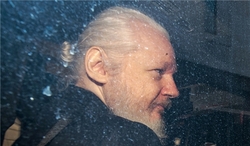 More than 70 UK lawmakers signed a letter urging both Home Secretary Sajid Javid and Shadow Home Secretary Diane Abbott to ensure Julian Assange faces authorities in Sweden if they request his extradition.
More than 70 UK lawmakers signed a letter urging both Home Secretary Sajid Javid and Shadow Home Secretary Diane Abbott to ensure Julian Assange faces authorities in Sweden if they request his extradition. RNA - According to the lawmakers, such a gesture will send a "strong message of the priority the UK has in tackling sexual violence and the seriousness with which such allegations are viewed", World News reported.
"We do not presume guilt, of course, but we believe due process should be followed and the [Swedish] complainant should see justice be done", the letter noted.
The 47-year-old Australian activist was arrested by British police on Thursday and forcibly removed from the Ecuadorian embassy in London after his asylum was revoked, bringing to an end seven years in the building.
Assange was taken into custody at a central London police station, and the arrest was made at a US extradition request, the Met Police confirmed. A lawyer for Assange has also confirmed that he has been arrested partly in relation to a request for extradition from the United States.
A London judge found Assange guilty of failing to surrender to bail in 2012. The WikiLeaks chief faces 12 months in prison for failing to surrender, and will be sentenced via video link in early May. The British judge stated on Thursday that the US must produce its case for Assange’s extradition by mid-June.
On Friday, Swedish prosecutors announced that they were examining the rape case at the request of the alleged victim's lawyer.
Separate from the British charge, Assange is also wanted for extradition by the United States. Although Washington quietly requested his extradition in 2016, the US Justice Department announced conspiracy charges against Assange on Thursday, stemming from his role in publishing classified military documents leaked by US Army whistleblower Chelsea Manning in 2010.
US prosecutors say Assange faces five years in prison if convicted of "conspiracy to commit computer intrusion", though further charges are expected to be brought against him.
Journalists and whistleblowers have weighed in on the indictment brought by the US against Assange, calling the current password-cracking charge “weak”, but setting a dangerous precedent for press freedom.
NSA whistleblower Edward Snowden has responded to the arrest of Julian Assange in London, tweeting that the images of Ecuadorian authorities handing him over to UK police were a “dark moment for press freedom”. In the tweet, Snowden stated that the images of a publisher of “award-winning journalism” being dragged out of the embassy would “end up in the history books".
Massimo Moratti, Amnesty International's deputy director for research in Europe told Al-Jazeera that if extradited, Assange would face the "risk of serious human rights violations, namely detention conditions, which could violate the prohibition of torture and other ill-treatment due to the possibility of solitary confinement."
"We also consider him at risk of being subject to an unfair trial and even the death penalty can't be excluded a priori. As a result of these risks, the UK at this point is under the obligation not to extradite him or otherwise send him to the US", he added.
US President Donald Trump, who said he loved WikiLeaks during his election campaign, tried to distance himself from the arrest of Assange, which was carried out by Britain on the request of Washington.
Speaking to journalists in the Oval Office on Thursday, hours after the arrest of Assange in London, Trump said, "I know nothing about WikiLeaks. It’s not my thing."
US lawmakers from both parties cheered the arrest of the WikiLeaks founder.
The prosecution – and persecution – of Julian Assange is meant to silence others who would speak out against abuses of power, WikiLeaks editor Kristinn Hrafnsson and Assange lawyer Jennifer Robinson stated, promising to fight back.
847/940